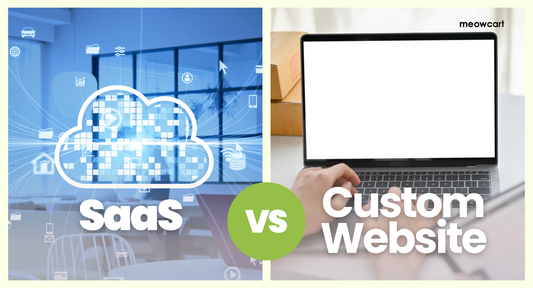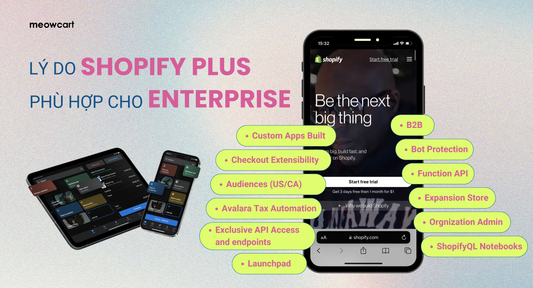Shopify Hydrogen: Technology Optimized for Headless Commerce
Headless commerce is becoming a trend in the e-commerce industry thanks to its ability to optimize performance and user experience. One of the most advanced technologies supporting headless commerce today is Shopify Hydrogen.
Shopify Hydrogen not only delivers superior performance, but also provides SEO optimization tools and theme customization, making it easy for developers to build flexible and effective e-commerce websites. This article will help you learn more about the benefits and how Shopify Hydrogen works.
See more: What is Headless Commerce? Benefits and how to apply it effectively
Shopify Hydrogen Overview
What is Shopify Hydrogen?
Shopify Hydrogen is an open-source, full-stack development framework built on React and optimized for online stores on the Shopify platform. Shopify Hydrogen is designed to help developers create fast, highly customizable storefront experiences for Shopify stores.

With Shopify Hydrogen, developers can build unique user interfaces while seamlessly connecting to Shopify's back-end systems. The framework provides access to important ecommerce data such as customer, product, and order information, helping to streamline the development and management of online stores.
What is Shopify Oxygen?
Shopify Oxygen is a cloud service that Shopify currently offers for free to support Headless Commerce deployments. It is a global hosting platform that can host custom content directly within the Shopify platform, including the Shopify Hydrogen app storefront, without the need for third-party hosting services.
One of the biggest advantages of Shopify Oxygen is its integration with Shopify’s extensive global infrastructure, which includes over 100 server locations around the world. This robust infrastructure ensures reliable and high-performance hosting for Headless Commerce stores.
Oxygen simplifies the hosting process and makes it easier to deploy and maintain headless commerce stores powered by Hydrogen. It manages the server components and complex requirements of building a Hydrogen user interface without the need for third-party hosting providers.
Key Features of Shopify Hydrogen
React-based Framework: Shopify Hydrogen is built on React, a popular, highly regarded JavaScript library for building user interfaces. React is known for its speed, efficiency, and scalability.
With Shopify Hydrogen being React-based, developers can leverage React's capabilities to create fast user experiences for ecommerce stores.
React's component-based architecture allows for easy management of complex UI components, making it an essential feature for building modern, responsive storefronts.
Server-side Rendering (SSR): Hydrogen's SSR feature improves page load speed and SEO. When a user visits a website, the initial HTML content is rendered by the server and sent to the browser, making the page load faster and improving the ability to be found on search engines.
TypeScript Support : TypeScript is an extension of JavaScript. TypeScript support in Shopify Hydrogen helps ensure safer and more maintainable code.
TypeScript checks for errors before the code is run, reducing errors during development. It also provides powerful tools for developers, increasing productivity and project quality.
Pre-built Components: Hydrogen comes with a library of pre-built components. These components include essential e-commerce functionalities like shopping cart, variation selector, and content library.
Using these pre-built components saves developers time and effort, allowing them to focus on creating custom features for their own brand.

Advantages of Shopify Hydrogen in Headless Commerce
Highly Customizable: Despite having pre-built components, Hydrogen still offers extensive customization capabilities, allowing developers to create unique and branded user interface experiences.
You can design unique layouts, add personalization features, and tailor the shopping experience to your brand’s specific needs. This flexibility ensures your website stands out and meets your customers’ expectations.
High Performance: Hydrogen is built with performance in mind. Shopify Hydrogen enables you to create lightning-fast SSR apps on Shopify, delivering superior site speed and responsiveness. This improves customer experience and increases conversions.
Developer Friendly: Hydrogen uses React, a popular JavaScript library that is familiar to many developers. This makes it easier for them to work with.
The framework includes pre-built components and hooks that simplify common tasks, speed up project development, and reduce the amount of custom code required.
Seamless integration with Shopify: Hydrogen is designed to work seamlessly with Shopify's back-end. This means you can take advantage of Shopify's powerful ecommerce features, such as inventory management, payment processing, and customer accounts, while still having the freedom to design your user interface independently.
GraphQL Support: Hydrogen uses GraphQL to fetch data from your Shopify store. The efficiency and flexibility of GraphQL allows you to request the data you need and reduce the amount of data transferred. This improves performance and makes data management easier.
Improved User Experience: With Hydrogen, you can create engaging user interfaces that respond quickly to user actions. This can make your eCommerce store easier to navigate and shop, encouraging customers to spend more time on your site.
Timeless Technology: Implementing Headless Commerce with Hydrogen means that the front-end is separated from the back-end. This makes it easy to adapt to new technologies and trends in the future.
As the ecommerce landscape evolves, you can update your front-end without having to overhaul the entire system.
Integrations: Shopify Hydrogen can integrate with a variety of platforms to extend the functionality of your online store, such as content management systems (CMS), payment gateways, or search services like Algolia.
For example, Shopify Hydrogen can integrate with headless CMS like Contentful , Sanity , or Strapi allowing you to manage and deliver content independently of your store, allowing for a more flexible content strategy.
Global reach: With Hydrogen, you can optimize your store for international markets. Features like multilingual support and localized content help you reach international customers more effectively.

Shopify Hydrogen vs Shopify Liquid Comparison for Ecommerce
When developing an e-commerce website on Shopify, choosing Shopify or Liquid will have different impacts on the performance, flexibility, and user experience of the website. These two technologies represent different approaches to creating an e-commerce website on Shopify.
The comparison table below will help analyze the important differences between Shopify Hydrogen, designed for Headless Commerce, and Liquid, the core template language for setting up traditional Shopify websites. Each tool has its own advantages and limitations, serving different purposes and needs of each business.

The Basic Differences Between Shopify Hydrogen and Shopify Liquid
Who should use Shopify Hydrogen?
Shopify Hydrogen and Oxygen are best suited for enterprise-level businesses with complex requirements, running or wanting to move to a Headless Commerce model that integrates seamlessly with Shopify.
This approach is tailored to large, high-performing businesses due to the higher maintenance costs and investment required to launch a Headless Commerce store. While Shopify has traditionally been the choice of small brands, Shopify is now evolving to cater to the needs of growing businesses, especially with the introduction of its Headless infrastructure.
Another point to note is that using Shopify Hydrogen and Shopify Oxygen requires a certain level of expertise and technical knowledge, access to resources, and a willingness to adapt to the evolving technology landscape.
Case study of Shopify Hydrogen application in Vietnam
In Vietnam, Vinamilk is one of the pioneering enterprises implementing the Headless Commerce model with Shopify Hydrogen.
Vinamilk is a leading brand in the dairy industry in Vietnam. In the context of businesses needing a flexible solution to manage and optimize online shopping experiences, meeting the needs of a large and diverse customer base, Vinamilk decided to switch from the Haravan platform to Shopify Plus and a Headless CMS system, to build a new system according to the Headless Ecommerce model.

This change helped Vinamilk achieve positive results. User engagement improved, including longer average session durations, lower bounce rates, and increased page views. In addition, conversion rates also increased significantly, reflected in transactions and sales.
The above examples from Vinamilk show the improvement of the website when converting to the Headless Commerce model built on the Shopify platform.
In recent years, the demand for building Headless Commerce websites with the Shopify platform has increased significantly. Now businesses can deploy the Headless Commerce model with Shopify's Tech Stack including Shopify Hydrogen and Shopify Oxygen. These are considered the most flexible tools today, meeting the increasingly complex needs of the market.
In the increasingly competitive e-commerce landscape, adopting cutting-edge technology like Shopify Hydrogen has become a key factor for businesses to maintain and enhance their market position.
Seize the opportunity and explore the potential of Shopify Hydrogen to take your business to the next level in the era of omnichannel e-commerce. Contact Meowcart now for detailed advice on Shopify Hydrogen and the best headless commerce solutions for your business. With our experience, we believe we can help you break through in the e-commerce market.




